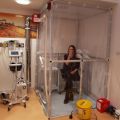New meningitis vaccine set for widespread use
A new vaccine to protect children against the most common form of meningitis was recommended for approval by the European Medicines Agency (EMA) on Friday.
The meningitis B vaccine from drug firm Novartis is now set to be licensed in the next few months, with researchers from Oxford University having played a significant role in the vaccine's development.
National governments across Europe can then consider introducing the vaccine into childhood immunisations programmes, with babies from two months old able to receive the jab.
Meningococcal disease is caused by the bacterium Neisseria meningitides and most often affects babies and young children. It causes a range of serious, life-threatening diseases including septicaemia and meningitis. Overall, 1 in 10 cases results in death, while 1 in 5 survivors have permanent effects such as skin scars, limb amputations, hearing loss, seizures and brain damage.
Meningitis is notoriously difficult to spot in the early stages and progresses very quickly. There are 13 different types of the bacterium, with type B being the most common in the UK.
Professor Andrew Pollard, who heads the Oxford Vaccine Group at Oxford University, said: 'The licensure of a group B meningococcal vaccine is a big step forward towards the hope of controlling this devastating disease.'
Professor Richard Moxon and Professor Pollard from the University of Oxford's Department of Paediatrics have been involved during much of the vaccine's development, from the original concept to clinical trials.
In the late 1990s, Professor Moxon was involved in steps to use the DNA genome of the bacteria that causes meningitis B as a tool to help discover new vaccine targets.
Since then, Professor Pollard, Dr Matthew Snape and the Oxford Vaccine Group have been heavily involved in the clinical trials that have demonstrated the safety and effectiveness of the Novartis vaccine, enrolling over 1,000 children and adults from Oxfordshire and the local area. This has helped provide the evidence base for the EMA's recommendation to approve the vaccine for widespread use.
Dr Snape, Consultant Paediatrician and Vaccinologist at the University of Oxford, said: 'We were delighted to hear the news that a new vaccine against meningitis will be licensed, having played a major part in this vaccine’s development.
'The vaccine targets serogroup B meningococcus (MenB), a major cause of childhood meningitis in the UK and other industrialised countries. Given the disease most commonly targets young children, having been able to enrol large numbers of healthy children into these trials has been incredibly important for this vaccine's development. Indeed, we administered the first dose of this vaccine ever given to a child just over 5 years ago. Seeing that the vaccine is now going to be licensed is very rewarding.'
Following introduction of a vaccine against meningitis C in 1999, the number of cases caused by the type C of the bacterium fell by over 90% in vaccinated groups, and by around 66% in non-vaccinated groups due to herd immunity. There have been only 2 deaths in children and young people under 20 in the last 5 years, compared to 78 deaths the year before the vaccine was introduced.
With the success of the MenC vaccination program, type B infections now account for 90% of the cases of meningococcal disease. It is hoped the new Novartis vaccine will now provide similarly wide-ranging protection against type B infections as the MenC vaccine.
Andrin Oswald, Division Head of Novartis Vaccines and Diagnostics, which makes the vaccine called Bexsero, said: 'We are proud of the major advance that Bexsero represents within the field of vaccine development against what up until now has been a very challenging disease target.
'For over two decades, our researchers and clinicians have been dedicated to finding a solution to prevent MenB disease. Our steadfast determination has been inspired by the testimonies from survivors and families who have lost loved ones to this disease.'
 New Academic Champion for Policy Engagement appointed
New Academic Champion for Policy Engagement appointed
 Breakthrough aerosol human infection model gives hope for future tuberculosis vaccine development
Breakthrough aerosol human infection model gives hope for future tuberculosis vaccine development
 Four ‘outstanding research leaders’ at Oxford awarded major European Research Council grants
Four ‘outstanding research leaders’ at Oxford awarded major European Research Council grants
 Study improves understanding of effects of household air pollution during pregnancy
Study improves understanding of effects of household air pollution during pregnancy
 Breakthrough promises secure quantum computing at home
Breakthrough promises secure quantum computing at home